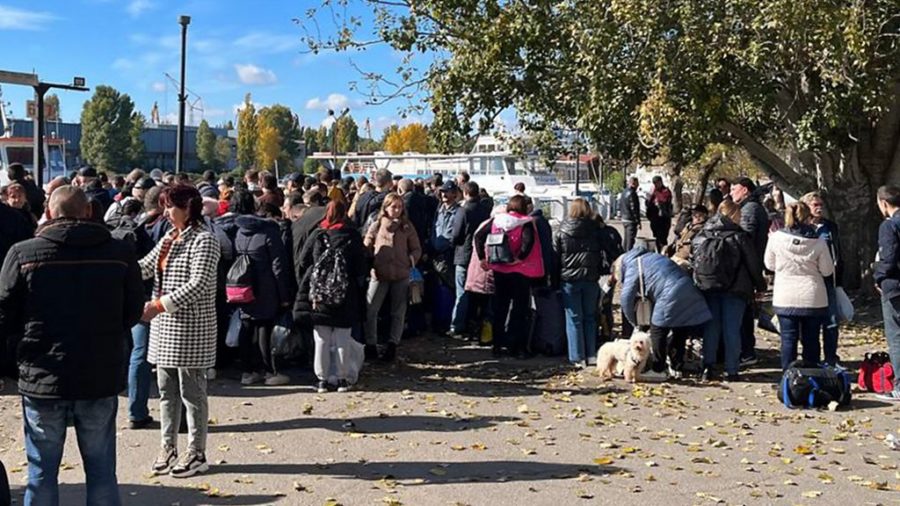Russia creates atmosphere in occupied Kherson region encouraging people to leave – research
During the occupation of Kherson region, Russia deliberately created coercive conditions for leaving the occupied territory. In addition, the Russian Federation planned to displace the population of Kherson region to Russian territories in advance.
 Displacement of Kherson residents by Russia / BBC
Displacement of Kherson residents by Russia / BBC This is stated in the research by the Human Rights Centre ZMINA on the deportation of residents of Kherson region. The analytical report covers the period from the beginning of the occupation of Kherson region (February 24, 2022) to February 24, 2023.
According to the researchers, due to restrictions on access to information, restrictions on the right to freedom of speech and opinion, threats to life and health, as well as cases of illegal detention, torture and murder, the spread of rumors about the flooding of villages and cities due to the destruction of the Kakhovka HPP, it is possible to say that Russia deliberately created an atmosphere of fear in Kherson region to make the residents of the region leave.
In addition, the scale and organization of the displacement of the population in occupied Kherson region indicate that this process was planned: “The Russian authorities prepared a communication strategy in advance, printed leaflets and made recordings of announcements, spread disinformation about blowing up the Kakhovka HPP, a large-scale offensive of the Armed Forces of Ukraine and planned shelling, organized buses and trains, launched programs for providing certificates for the purchase of housing, mobilized resources for the creation and operation of temporary accommodation centers.”
All this was also carried out under conditions of psychological pressure on the local population: people were threatened with physical force for any manifestation of a pro-Ukrainian position and disagreement with the actions of the occupation authorities.
Human rights defenders of Human Rights Centre ZMINA believe: it is difficult to call the decision to leave voluntary in such an atmosphere.
Regardless of the direction of departure – to the controlled or occupied territory – the population leaving Kherson region underwent “filtration measures” at checkpoints (in both directions, there were dozens of checkpoints and checks), through which people tried to leave the areas of military operations.
During the checks, representatives of the Russian army were particularly meticulous about people who were going to Ukraine-controlled territory.
The filtration procedure, as at other filtration points, included document checks, searches of cars, personal belongings, phones and computer equipment, fingerprinting, taking photos, undergoing interviews with Russian military personnel, and a personal examination (usually for men).
ZMINA documented the testimony of a Kherson citizen whose family underwent a filtration procedure. The man’s wife and daughter passed the check (documents, fingerprinting, short interrogation, the Russian military received the contact details of the man’s and woman’s parents), the man was arrested without reason and kept waiting for 10 hours and then was again taken out for interrogation. According to this family, to obtain a permit to go further, they had to provide the contact details and address of their relatives in the occupied territory and abroad.
“The direction of displacement and support programs implemented by the Russian Federation in its territory, as well as the restrictions on the return route to the occupied right bank of the Dnipro River, testify to the plans of the Russian Federation to immediately displace the population of Kherson region to its territory, and not to other occupied territories of Ukraine. Such an intention is inconsistent with the norms of international humanitarian law,” the research says.
Moreover, there was no reason for such an “evacuation” since there was no threat, which was informed by the representatives of the occupation authorities. And no alternative to the displacement of people from their territories was considered.
“Based on this, it is possible to claim that there are signs of the crime of forcible transfer and deportation of the population from the territory of occupied Kherson region,” human rights defenders said.
Read more about the research findings in Ukrainian and English.
If you have found a spelling error, please, notify us by selecting that text and pressing Ctrl+Enter.















